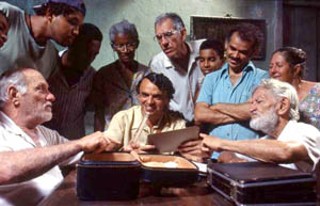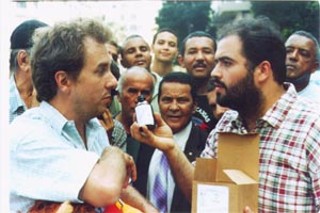All-Terrain Vehicles
The Seventh Annual Cine Las Americas Festival
Fri., April 16, 2004

Argentina, Brazil, Canada, Chile, Colombia, Cuba, Ecuador, El Salvador, Mexico, Nicaragua, Peru, Spain, Surinam, Sweden, and the U.S. Films by their people, for their people, and of their people. For seven years, this has been the drive behind the mission of Cine las Americas: "cross-cultural understanding and growth by educating, entertaining, and challenging the Central Texas Community through Film and Media Arts." Documentary or narrative; high art, low budget; long or short; established, emerging, political, whimsical, whatever: Mission accomplished, all while helping children on the Eastside (the nonprofit makes its home at Johnston High) and elsewhere.
What follows are the Chronicle's recommended Cine las Americas screenings, based on the pool of films that we've previewed as of press time. There's also a schedule on p.62. This year features one of the festival's most ambitious programs: A competition arm has been added, Brazilian cinema is particularly prevalent, and more than 60 films will screen from Wednesday, April 21, through Sunday, April 25, at the Alamo Drafthouse Downtown (409 Colorado), the Arbor (9828 Great Hills Trail), the Hideout (617 Congress), or the Millennium Youth Entertainment Complex (1154 Hargrave). All-access passes are available for $60 and can be purchased online at www.cinelasamericas.org or by calling 841-5930. Individual screening ticket prices vary. Check the Web site or call for more information.

Dois Perdidos Numa Noite Suja (Two Lost Souls on a Dirty Night)
D: José Joffily; with Débora Falabella, Roberto Bomtempo Far from the cozy abode of Chandler and Monica, the New York of Two Lost Souls on a Dirty Night seems more akin to the cutthroat urbanscape of The Apprentice – except with more transsexuals, drug addiction, and murder. Fresh from jail, Tonho (Bomtempo) returns to his ramshackle digs and vaguely gendered roomie, Paco (Falabella). Although barely legal and prone to illicit drugs and explicit (read expensive) sexual acts, Paco plays Tonho like the jam box she hopes will lead her to a singing career. As bad days turn to worse months, the America-weary Tonho becomes desperate to return home to Brazil. Luckily, Paco, whose moral compass points south throughout the film, has a get-rich-quick scheme. Two Lost Souls on a Dirty Night sheds light on the rock, the hard place, and what choices are left when the two start closing in. – James RenovitchArbor, April 23, 7pm

South American Shorts
Neither documentary nor narrative, "Porter" (Millennium, April 24, 6pm) blends footage of Peruvian porters with narration based on interviews with the men whose job it is to keep adventure tourists well-fed and blister-free during their four-day hike along the Inca Trail. Fine camerawork and an unforgiving eye for detail turn the images of the porters jogging along the rocky trail, backs bent and muscles straining as the tourists hover unencumbered in the background, into a moving metaphor for all kinds of global inequity."Upon the Earth" (Arbor: April 22, 9pm; April 24, 2pm) is an eye-pleasing meditation on the eternal human tendency to say "gimme." In a sun-blasted Argentinian desert, two children fight over a ratty burlap bag, the stark nothingness of the landscape heightening the absurdity of their situation.
– Rachel Proctor May
Cuban Shorts
Chaos reigns in two shorts from Cuba. Eduardo Eimil's brief farce "La Maldita Circunstancia" (Arbor, April 23, 9pm) is a surreal glimpse at life in an urban block – specifically the basement of a building where some poor schlemiel wakes up to find his flat flooded knee-deep. Plumbers, plungers, and paramedics are no help, so he resorts to a low-tech solution. Juan Carlos Garcia-Sanpedro's "Save Your Lips in Case I Return" (Millennium, April 24, 4pm) is longer and more dramatic, the tale of a Madrid belly dancer (Claudia Rojas) with two aggressive suitors (Roberto Perdomo and Manuel Navarro). The story begins with a postal mishap and ends with an unlikely resolution. In between, Garcia-Sanpedro dollies his camera like Max Ophüls and crosscuts the two relationships with clever invisible edits. – Marrit Ingman
Mexican Shorts
Entre Dos (A Way Out)
D: Michel Franco Desperation can be a particularly ugly emotion, but Franco's film quietly thrums with a kindred strain of possibility that offsets a young couple's increasingly frustrating search for a liver donor for their 10-year-old son. Alternating between the scenes of one mother with an urgent mission and others on the verge of the unthinkable, Entre Dos, with its coolly formal cinematography and lean scripting infuses the pain of all involved with an almost clinical sense of portentous beauty and, finally, hope.
Arbor: April 24, 5pm; April 25, 5pm
Contratiempo (The Third Movement)
D: Mauricio Bidault The aged proprietor of a musical-instrument store, a burglar, and yet another burglar all come together one dark and fortuitous night to play out a symphony of need, greed, and one dry clarinet reed in this subtly comical short that pits one criminal against another (and possibly even another). Lush photography and a trio of pitch-perfect, finely calibrated performances play off each other in this short that proves introducing a firearm in the first act doesn't necessarily mean everyone is who they say they are in Mexico City at midnight.
Millennium, April 24, 4pm
Dorado (The Goldfish)
D: Patricia Arriaga The complex cinematic constructs of Alejandro Gonzalez Iñárritu have nothing on Arriaga's short, which examines slices of life in a Chinese restaurant in Mexico City through the eyes of the aquatically isolated title character. A young boy with a penchant for playing with matches (both literally and figuratively), a couple with infidelity issues, a man and his aged mother, a libidinous street hood, and a birthday celebration are all on display to the burbling observer, who, from his curiously omniscient perspective, neither judges nor comments, but simply is. God as goldfish? Why not – this is Mexico City, and anything can happen.
Millennium, April 24, 4pm
– Marc Savlov

Fala Tu
D: Guilherme Coelho Single mom Monica – or Combatente, the nickname she prefers – telemarkets during the day. Toghum hawks miniature souvenir books. Maccãro hangs out on a stoop, running numbers. When they're not scraping by, all three are part of Rio's hip-hop movement, rapping on underground radio about life in the favelas, the hillside slums surrounding the city. Maccãro is a hardcore rapper; his new song about police harassment of prison visitors has made it onto the radio in other parts of the city. Combatente's group Negaativa ("a female version of Wu-Tang Clan") exhorts single moms to be strong and chides the girlfriends of drug dealers. Toghum is the film's best subject, a KRS-One-type rapper whose empowering rhymes exemplify his upbeat approach to life – surprising for a guy who intervened in a knife fight between his parents when he was five. Fala Tu interweaves their stories compellingly, but it is after the film's first half that it really hits its groove, building narrative momentum that lifts this documentary above its topic and into the realm of fine nonfiction filmmaking. – M.I.Millennium, April 23, 10pm
Manhattan: A Moving Picture Postcard
D: Steve Bilich; with Terry Coyote Murphy "Manhattan: A Moving Picture Postcard," shot in black and white, set against ambient driftwood-souvenir-buying music, is a meditative montage that follows a Native American on an urban hike through pre-9/11 Manhattan. With his braids, he conjures the iconic American Indian, clearly emphasizing not the cityscape but what came before it. But mustachioed, blue-jeaned, and backpacking along, he's also your everyday tourist, people-watching and exploring an ever-evolving city. Then come speeding ambulances and billowing debris, and miraculously caught on film is our time-traveling tourist looking past the camera, stolid, as the twin towers smoke and collapse behind him. – Nora AnkrumArbor, April 24, 3pm

Narradores de Javé (Storytellers)
D: Eliane Caffé; with José Dumont, Nelson Xavier, Gero Camilo, Luci Pereira, Nelson Dantas, Mário César Camarago It seems the town of Javé has nothing if not stories to tell. Or maybe that's nothing but stories to tell. Regardless, when the government's dam project threatens to submerge the berg, the tough get going. The townspeople call upon the unscrupulous, utterly charming, but uniquely literate town pariah Antônio Biá (Dumont) to transcribe their oral history into a "scientific" historical document that will reveal the culture of Javé to be worthy of dry land. As Biá collects the stories of the town's origins, ranging from heroic narratives to supernatural thrillers, it becomes obvious that the position of town scribe is a precarious one. Before long, the populace is bickering over whose ancestors are the heroes of the story. Perhaps the antihero, Biá sets out with a spring in his step before the reality of the impossibility of his situation hits him. (Whether dancing or moping, Dumont is a delight to watch.) As the waters rise, Javé's lofty tales might be the only things keeping the town's head above water. – J.R.Arbor, April 22, 7pm
O Caminho Das Nuvens (The Middle of the World)
D: Vicente Amorim; with Cláudia Abreu, Wagner Moura, Ravi Ramos Lacarda Rosa reads aloud to her husband from a road sign: "Middle of the World Square." The couple looks more like they're in the middle of nowhere. Behind them their children rest on the ground, and alongside them a dirt highway extends into a brown horizon empty but for the dust and their toddler sitting in the middle, having crawled there inconspicuously. And as the family realizes this, a truck rumbles into view, headed straight for the kid. Thus begins the true story of a family of seven that ends up bicycling 3,000 miles through Brazil in search of a living wage. The illiterate father, Romao, has placed all his faith in his patron saint, convinced he'll be blessed with the unlikely salary his family needs. Through town after jobless town, the family pushes on, and despite the growing desperation of their circumstance, they remain recognizable – the oldest son battling his father and eyeing the local girls, the younger children silly and spontaneous. While it's no road trip in the family minivan, O Caminho Das Nuvens achieves a familiarity, helped by its intimate cinematography – all sun-baked skin and earth, freckles and wind-tousled hair – that leaves you feeling sunburned and saddle-weary. – N.A.Arbor: April 23, 5pm; April 25, 5pm

Native American Series
Expanding on last year's inclusion of films by Native American filmmakers, several documentaries, features, and short features are included in this series. Screened films include:
Cowboys and Indians: The Killing of J.J. Harper (Millennium, April 22, 8pm): After a Canadian Indian activist is killed by a Manitoba constable, his surviving brother and friends seek justice, exposing a law enforcement system that fails to address its wrongdoing. "I Belong to This" (Millennium, April 24, 2pm): A poignant meditation on life by a young father and husband struggling to make peace with his conflicted cultural identity in the 21st century. "Blood River" (Millennium, April 22, 8pm): A Native American law student, adopted by a well-meaning anglo woman, searches for her birth family. Though she learns her mother is dead, she discovers a brother she never knew she had and makes a spiritual – and possibly dangerous – connection to her brother's troubled lifestyle. Dreamkeeper (Millennium, April 25, 11am): Originally aired on ABC last December, this lusciously filmed two-part miniseries offers a sweeping concert of Native tales from throughout North America. The film follows a put-upon teenager forced into driving his aging grandfather to his last All Nations Powwow. On the road, the elder passes the ancestral tales on to his reluctant grandson, who eventually learns to embrace his cultural history and face his personal demons head on.
– Belinda Acosta
The Passion of María Elena
D: Mercedes Moncada Rodríguez When María Elena's son is run over by a truck, she must deal with not only the grief of her son's death but also the ensuing culture clash between her community – the traditional Rurímuri of Mexico's Tarahumara Mountains – and that of the urban mestizo woman who ran over her son. The Passion of María Elena documents the mourning mother as she pursues restitution through a Rurímuri trial and then a Mexican one, both of which reveal the racial prejudices of the two communities, a legal system that favors the fair-skinned, and a mounting tension between modern and traditional ways of life. – N.A.Millennium, April 23, 6pm

Brazilian Shorts
When money is tight and desperation looms, there are few paths to choose and even fewer morally sound choices. A pressing debt pushes José (Moreira) and João (Pedrosa) to the extremes of familial betrayal when they look to their comatose father for money in "Rua da Amargura" (Arbor: April 22, 5pm; April 24, 1pm). Their father's caretaker must fend off the dastardly plot of her morally bankrupt brothers. In "Tricks, Teas and Trust" (Arbor, April 23, 5pm) a down-on-his-luck street vendor looks to a more successful salesman for helpful hints and gets sold down the river. But like they say: Fool me once, shame on you; fool me twice ... uh, what's Portuguese for "fool"? – J.R.
Texas + 1
Half Cocked Firelock: Time Served in Santa Anna's Army
D: David N. Reyes Concurrent with the monster release of John Lee Hancock's blustering reimagining of the siege of the Alamo, this short documentary examines the lives of the film's Hispanic extras, from one young man who, despite the long days and low pay, manages to wrangle a Hollywood stuntman contract out of the production, to another who has created a complete comic book detailing the hard-luck miseries of the extras' travails. It's never all fun and games on a film set, much less a bumpy major studio feature with an entire re-creation of Santa Anna's army in it, but "Half Cocked Firelock" manages to bring home both the joy and the difficulties of the experience, with not a little wry humor tossed in for good measure. You'll think twice about signing up for your next extras gig after this one.
Hideout, April 25, 1pm
Oaxacan Hoops
D: Olga R. Rodriguez The story of how and why the very American sport of basketball came to the Mexican province of Oaxaca and then migrated along with the local indigenous peoples to Los Angeles is one of the great mysteries of life, or at least it should be – regardless, Rodriguez's minidocumentary is both utterly unique and fascinating. The notion of Zapotec Indians, who are known for their lack of height, dribbling around the court and firing off perfect, all-net shots might strike one as culturally unlikely and even downright ludicrous, but the sport and the people have evolved alongside each other and are now oddly inseparable.
Hideout, April 25, 1pm
Gringotón (Gringo-Thon)
D: Greg Berger An absolutely cunning and frequently hilarious reversal of cultural identity in this short from director Berger, an American expat living in Mexico City, who, frustrated at the world events unfolding during the American invasion of Iraq in 2003, takes to the streets dressed as the ultimate ugly American and, instead of playing up the archetype, washes windows, solicits donations from riders on public transit, and generally follows the lot of any one of Mexico City's many impoverished citizens in hopes of raising enough money to fund a guerilla army to remove the corrupt Norte Americano regime from office. Insane? No more so than the Bush administration, it would appear.
Millennium, April 24, 4pm
– M.S.

La Canción del Pulque (Pulque Song)
D: Everado Gonzáles Pulque is a fermented beverage made from maguey, the same succulent whence cometh tequila. It's cloudy, earthy, and drunk primarily by the poor in special bars in Mexico (called, of course, pulquerías) where it's the only thing to drink. Pulque Song takes viewers on a meandering, vérité-style tour of the life cycle of pulque, from harvesting the maguey pulp to swilling the cloudy brew as some guys with accordions and guitars holler out bawdy – and we do mean bawdy – little ditties in the corner. It's a world of inebriation that bears little resemblance to, say, Cancún, and which maintains strong links to the indigenous past, when pulque was a somewhat religious beverage. The continued relevance of this idea is dramatically illustrated by scenes of musicians singing blessings over the gassy vats of half-brewed pulque.– Rachel Proctor May
Millennium, April 24, 6pm

Red Cockroaches
D: Miguel Coyula; with Adam Plotch, Talia Rubel, Diane Spodarek, Jeff Pucillo, Limor Shopen Armed with a Canon GL1 and little else, Cuban-born writer-director (and editor-producer) Coyula shot this science-fiction feature largely on the sly in New York City and surrounding environs. It's got its problems, but a lack of invention isn't one of them. Coyula has a comic-artist's eye for expressionistic visual language, and he saturates his begged, borrowed, and stolen locations with intense colors that create a convincing atmosphere of post-apocalyptic (and personal) doom. The result is a purposefully synthetic environment reminiscent of latter-day Hitchcock: obvious process shots, mirror shots, double exposures, a bleep-bleep Casiotone score (performed by the filmmaker himself), stilted acting, and situations that feel contrived, as if to suggest the difficulty of organic interpersonal communication. Some of it works, and some of it doesn't. The budget isn't always to blame. The tension of a family reunion at a house upstate, for example, is underscored by rear projection (good) and the howling of canned wolves in the sound mix (bad). Add in the deliberately obscure plot (what exactly is DNA 21, a high tech corporation with a shadowy role in the futuristic events at hand – acid rain and mutant life forms?), and you have a film that is at times hard to watch; one that enjoys frustrating your expectations. Viewers who are sympathetic to the avant-garde, however, will likely take pleasure in Coyula's cinematic taunting. He's a bit like the love child of John Carpenter and Mark Rappaport, if such a thing were possible. Certainly Red Cockroaches is worth a look for its bravura, which should endear the movie most of all to prospective filmmakers with maxed-out credit cards and heads full of dreams. – M.I.Millennium, April 22, 10pm; Arbor, April 23, 9pm

The Shaman's Apprentice
D: Miranda Smith Rainforests are burning, indigenous communities are threatened, we might have just chopped down a cure for diabetes ... little of the political message of The Shaman's Apprentice, a portrait of North American ethnobotanist Mark J. Plotkin, will surprise anyone who has read a newspaper in the last, oh, 15 years or so. But self-importance (and some seriously cheesy scripting) aside, The Shaman's Apprentice is chockablock with neato facts about plants, shamans, alkaloids, and the dream world. Plotkin serves as the audience's guide to the Suriname communities where he has been conducting research for decades (compare the scenes shot in the Eighties with more recent footage for a striking illustration of how fast things are changing), explaining how they, like 80% of the world's population, use plants as medicine. He also shares quite a bit about himself, from ruminations on European witchcraft to how he came to be interested in the chemical properties of rainforest plants in the first place. (Let's just say it had something to do with it being the Sixties.) – R.P.M.Hideout, April 24, 4pm
Uma Onda No Ar (Radio Favela)
D: Helvécio Ratton; with Alexandre Moreno, Adolfo Moura, Babu Santana, Benjamim Abras A battalion of police officers winds up the hillside of a Brazilian favela, weapons drawn for another bloody raid. Neighbors scurry, and community-radio deejay Jorge (Moreno) shouts out a warning: Everybody stay inside and close your windows. The local drug gang mobilizes for defense; scouts with semiautomatics climb onto the roof of their shanty. But the junk pushers aren't the criminals under assault. Jorge is. He spins sambas and community news – it's hard to imagine what's so dangerous about "Radio Favela" on FM 104.5. In a flashback from jail, Jorge talks about growing up poor, the only black-skinned student at the school where his mother mops the floor. In the slum, getting out is the only alternative to a life of crime. But Jorge finds a third path: Staying in the community and fighting the rampant racism that divides Belo Horizonte. This true story is slick by festival standards, with earnest performances and an inspiring message about the power of words. It's not flashy über-cinema like Fernando Meirelles' City of God, but its production values are solid and the story compelling. – M.I.Arbor: April 22, 5pm; April 24, 1pm

Surplus: Terrorized Into Being Consumers
D: Erik Gandini The subhead for Surplus: Terrorized Into Being Consumers pretty much sums up the straightforward message and combative tone of the film. In a gleefully unsubtle indictment of consumer society, Swedish filmmaker Erik Gandini uses a series of thematically linked but stylistically diverse segments to highlight the absurdity and the tragedy of our comfortable way of life. The segments – nicely shot, frenetically edited – include montages that juxtapose images of material prosperity with those of poverty in a sort of agit-prop music video, straightforward interviews with critics and producers of consumer products, and that cute editing trick where you match lip movements to unrelated narration to make it look like Bush, Blair, and other world leaders are delivering the message of an Adbusters rep. Some folks may bristle at the moral absolutism of the piece, as illustrated by author John Zerzen's (and the filmmakers') comparison of consumerism to terrorism, as well as its failure to move beyond the fairly simple point that corporate oligarchy is veeeerry baaaad into more troubling questions of, say, the filmmakers' own implication in the system he critiques. However, as the snippets of Bush admonishing the nation to not let the terrorists frighten us into not shopping demonstrate, perhaps the overblown rhetoric is just how you have to get the point across these polarized days. So go watch the film and hallelujah along with the choir, but then set the karmic balance right by finding the CEO of a multinational corporation to hug. – R.P.M.Millennium, April 25, 2pm
Cine Las Americas Schedule
Wednesday, April 21
Nicotina: Alamo, 7pm
Thursday, April 22
Change Up (short): Millennium, 5pm
Rua da Amargura (short), Uma Onda No Ar: Arbor, 5pm
The Sixth Section (short), Farmingville: Millennium, 6pm
Narradores de Javé: Arbor, 7pm
Blood River (short), Cowboys and Indians: The Killing of J.J. Harper: Millennium, 8pm
Sobre la Tierra (short), Un Oso Rojo: Arbor, 9pm
Red Cockroaches: Millennium, 10pm
Friday, April 23
Don't Call Me Tonto: Arbor, 3pm
Los Rubios: Millennium, 4pm
Tricks, Teas and Trust (short), O Caminho Das Nuvens: Arbor, 5pm
Boi (short), The Passion of María Elena: Millennium, 6pm
Produto Descartável (short), Dois Perdidos Numa Noite Suja: Arbor, 7pm
The Kidnapping of Ingrid Betancourt: Millennium, 8pm
La Maldita Circunstancia (short), Red Cockroaches: Arbor, 9pm
Fala Tu: Millennium, 10pm
Saturday, April 24
Resistance: Treating AIDS in Brazil, Jornada de Lucha, Argentina: Growth or Disappearance: Hideout, 11am
Emergencia: A Celebration of Emerging Filmmakers: Millennium, 11am
Silver Cities of Yucatan: The Mason-Spinden Expedition, Streams of Gold: Hideout, 1pm
Rua da Amargura (short), Uma Onda No Ar: Arbor, 1pm
Curupira, Sobre la Tierra, El Descampado, La Historia de Todos, La Maldita Circunstancia, I Belong to This, El Pedestrion (shorts): Millennium, 2pm
Yo No Sé Qué Me Han Hecho Tus Ojos: Hideout, 3pm
Manhattan: A Moving Picture Postcard (short), Cowboys and Indians: The Killing of J.J. Harper: Arbor, 3pm
The Shaman's Apprentice: Hideout, 4pm
Contratiempo, Dorado, Sus Demonios, Gringotón, The Show, Los Desaparecidos, Save Your Lips in Case I Return, Cocteau Cento (shorts): Millennium, 4pm
East Side Stories: Hideout, 5pm
Entre Dos (short), Un Oso Rojo: Arbor, 5pm
Porter (short), La Canción del Pulque: Millennium, 6pm
Give Me Something (short), Restos (short), Surplus: Terrorized Into Being Consumers: Arbor, 7pm
Valley of Tears: Millennium, 8pm
Lara: Arbor, 9pm
El Segundo: Millennium, 10pm
Sunday, April 25
Merging Voices: The Youth of El Salvador Speak, Viva Chile M...!: Hideout, 11am
Dreamkeeper: Millennium, 11am
Oaxacan Hoops (short), Half Cocked Firelock: Time Served in Santa Anna's Army (short), Vaquero (short), Border Bandits: Hideout, 1pm
TBA: Arbor, 1pm
Composure (short), Girl Beat (short), Inventos: Hip Hop en Cuba: Millennium, 2pm
Verdades Ocultas: Hideout, 3pm
El Segundo: Arbor, 3pm
Boomtown: Hideout, 4pm
Letters to My Mother (short), Korda: Fotógrafo en Revolución: Millennium, 4pm
Entre Dos (short), O Caminho Das Nuvens: Arbor, 5pm
Surplus: Terrorized Into Being Consumers: Arbor, 7pm
Edifício Master: Arbor, 8pm








